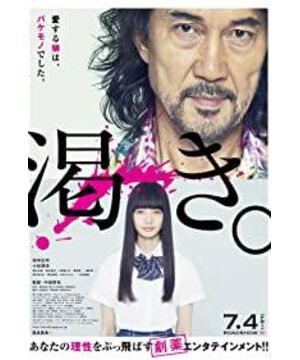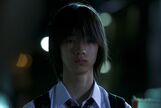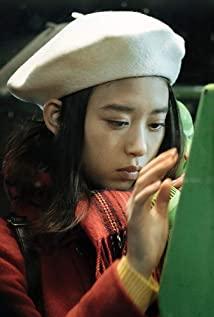It's not that people can't understand the films he made (in fact, not many people can understand them), but in "Desire", I really doubted in many places.
For example, what is the role of the policeman who smirks and licks lollipops all day long, and why does the father, the protagonist played by Yakusho Koji, want to find his daughter's body, and has repeatedly threatened to kill her again with his own hands? And how did Koji Koji of the yakusho find out that his daughter's junior high school head teacher was actually the murderer from just one photo? As for the psychiatrist's statement that Komatsu Nana was brutalized by Koji Koji in the prison and almost killed this part. This is a fact that happened because of "father"'s schizophrenia and mania, or is it pure fantasy, I really don't understand.
Although it is adapted from an award-winning mystery novel, the whole story just uses a simple framework, and it is not a suspense movie at all. What impresses the audience the most is the messy picture and how to play it. People who don't die. From my subjective point of view, it is difficult to say that this film is good, because there is not a single place that makes me like it, and even the ending has no meaning due to the accumulation of negative emotions.
What is a good movie like? Everyone has their own opinions, but to sum up my comments to everyone, it is probably that something that seems to be understood but has something to say is good. , must be "scum".
This is why, as long as a qualified foreign language film can always be praised, "one big" reason, while a domestic film of the same quality can only be scolded.
Or simply tell the story.
The film is divided into two lines to narrate, one is the past, the perspective is mainly the daughter played by Komatsu Nana, and the other is the present, that is, what Hiroshi Yakusho did.
The film uses this to create suspense and conflict. In the step-by-step disclosure, the "cute and good daughter" in the eyes of a parent is completely opposed and integrated with the "devil under the appearance of an angel" in reality. The editing and shooting techniques made me go crazy, so let's talk about the timeline.
There is an underworld criminal organization that specializes in kidnapping some cute-looking, weak-resistance young boys and girls for the ravages of some perverts, and these perverts are all "big men" with status and fame in society.
The heroine's friend (it seems to be her boyfriend) Ogata is a young man who was hurt by them, and Ogata chose to commit suicide by jumping off the building because he couldn't bear the humiliation.
It was precisely to avenge him that the heroine came into contact with this organization, and fell into it step by step. In the process of revenge (taking pictures of these customers), she also involved many innocent teenagers who liked her, resulting in A series of murders followed.
One of the innocent girls is Akiko, the daughter of the heroine's junior high school head teacher. This young girl who was only in her teens (indicated in the film just developed) also had a relationship with those perverts, and the excited junior high school head teacher stabbed the heroine Kanako to death in the car and buried it.
Kanako's parents divorced when she was very young, and the reason is that Kanako's mother Kiriko cheated and was discovered by her father Fujishima. Fujishima immediately beat his lover, and as a result, lost his job, and even the property and custody of his daughter.
After learning about Kanako's disappearance, Fujishima began to look for his daughter. This father, who suffers from schizophrenia and mania, almost always resorts to rude methods every time he asks for news, because he thinks his daughter is Good students, and the reason why they are involved in drugs is that they were brought up by those problem students, and everyone else should be responsible for it. But the truth revealed step by step made him even more mad. It turned out that his daughter was the devil who turned these classmates into problem students.
During the investigation of Fujishima, the underworld organization Ishimaru-gumi is also stepping up the search for Kanako's whereabouts, because Kanako has photos of their customers in their hands. Once released, there will be a devastating blow. To this end, they do not hesitate to resort to extreme means of killing , and because Fujishima was caught by the Ishimaru group, he was forced to kill a "police-level police officer" (also a guest of the perverted club) who had disobeyed the command for them.
After the confrontation, Fujishima killed the police department, and successfully broke through in the pursuit of the police. With a photo, he found out the truth, found the murderer, his daughter's junior high school class teacher, and threatened her to find Kanako's corpse.
The outline is not simple enough, it’s stinky and long, and there are even mistakes such as missing plots, but let’s just let it go.
The focus of the whole film is naturally the role of "Fujishima". He suffers from schizophrenia and mania. When he reaches middle age, he also encounters "wife cheating, unemployment, divorce and loss of real estate and custody of daughter", these tragic things, It was a miserable home.
And what did he do in the film? I just received a call from my ex-wife. When I went to see her, I took a shower and shaved, and took out a decent white suit, but as soon as I sat down at his original home, my toes were sticking out of the torn socks. (Not sloppy, not enthusiastic about life, but very good-looking) He
met his ex-wife and lived together. After a few days of investigation, he also raped his ex-wife. When questioning Kanako's classmates, teachers, and classmates' parents, she behaved rudely and called herself a policeman.
If a girl is caught on the street, she will be dragged home to go to bed, but she will be caught by the underworld, and the girl will be killed.
When he was caught by Ishimaru-gumi, Fujishima looked very weak and even filthy. In order to survive, he didn't care about anything. When he promised Ishimaru-gumi to deal with the police department, he also raped the police department's wife. (Severe sexual repression, no dignity, gain a sense of presence from abusing women, no moral values)
Of course, in the end, I insisted on digging alone, trying to find my daughter's body, and said something, as long as I'm still alive...the child is alive...kill Yunyun with my hands. (The attachment to family and love also disproves its lack.) After
all, Fujishima is a man who has lost his original life foundation and social relationships because of mental illness. Friends, there is a big difference between "missing people" who do not read their hometown, but, in essence, they are equally lonely.
In fact, the main characters in the film, especially the Fujishima family, are all such people, and to put it simply, they all lack "love", whether it is to be loved or to love someone, neither.
Kanako's mother Kiriko, who was called "always in love" by Kanako because of the death of her beloved Ogata, was still single when the events in the film happened. Not only that, as a mother, Kiriko not only betrayed her husband who was mentally ill, but also raised her daughter, who was awarded to her, as if she were "raising a pet dog". Kanako hardly cares, let alone understands.
But I don't put all the responsibility on Tongzi. In fact, the family of three fell apart, and everyone has his responsibility, big or small, there is not much difference. In the final analysis, it is refusing to communicate with the other party spiritually, always being too relaxed with oneself, letting oneself be too free, and pinning all hope on the other party when one is in trouble, which eventually leads to tragedy.
It was in such an environment that Kanako had this ability: to say what the other party wanted to hear most, seduce the other party, and then make the other party a mess.
And what is this sentence that others most want to hear? I love you.
It is this sentence that explains the meaning of "longing", and almost every main character in the film is involved in this terrible tragedy because of the desire to "love and be loved".
Especially the bullied boy played by Shimizu Hiroya is the most extreme and typical example. He was bullied at school and almost no longer wanted to be a human being. However, when Kanako appeared, she didn't actually show much "love". She just stopped the atrocities against this boy a few times, and finally used Matsunaga's power, Let him get rid of the life he had been bullied in the past. In the eyes of the boy who is seriously lacking in love, he has already received the warmth of being loved. After that, no matter how he was betrayed by Kanako, or even finally resisted, went to Kanako and was killed by her side, it was still the same. calm.
Similar to this is Matsunaga, for Kanako's "love", those gentle treatment and the sentence "I love you", he was willing to betray the organization, and even if he was tortured to death, he still shouted without regrets.
How terrible, but it in turn shows the "greatness of love". These people who lack love are willing to give up their lives for a little plausible tenderness. They are all emphasizing this "longing" for love, how much Terrible, and how sad.
From the plot where Fujishima found Matsunaga's mother, it can be seen that there is also no love in Matsunaga's family. Even if they are related by blood, it is equal to "no relationship".
Being in the family, in the school, in the middle of so many people, but not getting a little love, nor caring about the feelings of others, it is this kind of missed life that leads to a deformed mentality and a lack of love for love. Extreme desire makes people like Kanako take advantage of it.
If you are in trouble because you are betrayed by deceit, and you are deceived because you desire love, why is there a lack of love?
It's because I didn't really love, care, and connect others with myself. Such people are too free, so free that they give up and forget about love.
Kanako didn't receive love from her parents, but what makes her different from others is that she is in love with Ogata, she can understand the taste of "love" and how happy she is, but she is also too free, she is selfish He despised the "love" of others, and built his revenge for love on the basis of destroying the love of others.
Because of this, she was killed by the head teacher of the junior high school.
Actually, I don't understand what happened to the dispute between Fujishima and his daughter. Why did he kick the door and go in, why did his daughter say "I love you" in his ear, but he was so cruel. Is it just because he has schizophrenia and mania?
Fujishima's last obsession has actually conceptualized Kanako. She is no longer a living person, but just a "daughter" who represents family and care. Even Fujishima's father-in-law once said on the phone, don't you He thought that if he hid his daughter, he would be able to find his family.
Yes, Fujishima, who is longing for love, pursues her daughter not only to find her, but to get love and a family, and no longer be the "missing person" who had nothing to do with the people around her before.
In the beginning, human beings lived in groups for survival. Later, the habit of living in groups made us spiritually long for understanding and love, and this desire makes a person strive to build his own social relationships, whether it is friends, family, couples, all of them. It is needed in order to keep myself from falling into a situation of lack of love.
But we also love freedom, and too much freedom is like selfishness. Selfish people don’t care about other people’s feelings, just like Fujishima who always treats others roughly. People like him are naturally out of touch with society and are isolated in outside of relationships.
This is the case with the Fujishima family, as well as those students with problems. It can even be said that many people are like this. In order to be free and unfettered, they gave up "love" and no longer have a connection with society, but when they can't stand it spiritually, But he desperately longs for love, even to the point of life and death for a plausible "love".
Tongzi's derailment is probably because Fujishima didn't love him enough, and why should Tongzi care about her husband who is suffering from mental illness? They are all people who "follow their hearts" just for their own selfish desires. When they find out that their daughter has completely turned bad in such an environment, and they have no repentance, they just keep thinking that "the daughter is missing." , To get her daughter back, even Kiriko and her father believed that Kanako was hidden by Fujishima.
How absurd, yet reasonable.
Of course, in addition to the protagonist's family, there is also an opposite, which is particularly important, that is, Ishimaru-gumi, who makes money from porn clubs, and the perverted customers of porn clubs. The representative one is naturally the one who killed the employer. The crazy horny police department.
After the incident was revealed, the police asked his wife if he would not forgive him. As a result, his wife spat on him, and he shot his wife to death.
On the bright side, these people maintain a dignified life, but their hearts are full of desires that have nowhere to release. What they long for is to do a kind of perverted "love". In fact, their family and friends, and even the society, are in a state of ineligibility, because their hearts cannot be exposed to others, and society can never tolerate such perverted people. This is the police department who shot his wife and finally wanted to commit suicide. s reason.
Like those who have been violated by them, they are all people who have cut off normal relations with society. The only difference is that Kanako and the others are truly lonely, without real friends, no warm family, and no real life. The real lover, and the latter, has all this on the surface, but the real self, the perverts at the spiritual level, lack love and communication as well.
This is all I see, a free and selfish soul, afraid of loneliness, longing for love, but always destroying love with its own hands, whether it's his own or someone else's.
Perhaps this is what Fujishima meant by persistently wanting to exhume his daughter's body, saying that he wanted to kill himself?
The director can almost be said to be too bold on the screen. The dense double-line intersection and the unprovoked camera change have made the entire narrative a simple display. The soundtrack is also very exaggerated, such as the long scene about "party", which is simply a pompous MV, and the background music of the opera, which made me feel a little bit of a play, as if the story happened elsewhere.
In the end, what I dislike the most is all the characters in the film, and I hate the director's handling of these characters. Maybe they appear for no reason and then die for no reason, so that the "longing" can come deeper.
View more about The World of Kanako reviews











